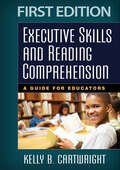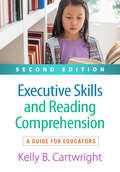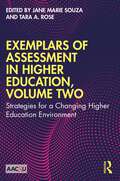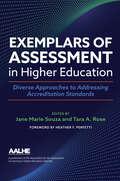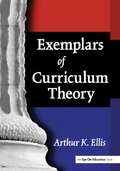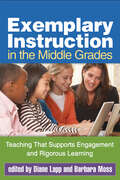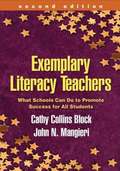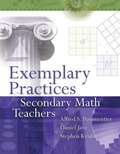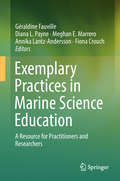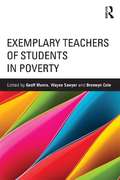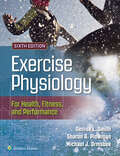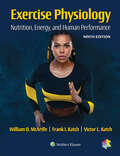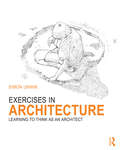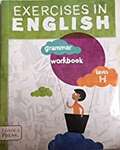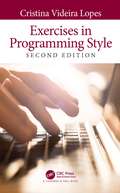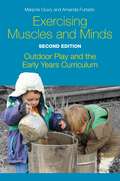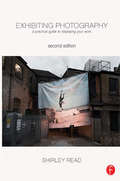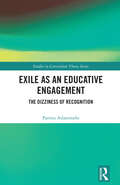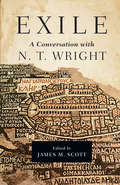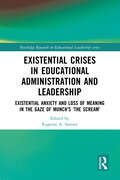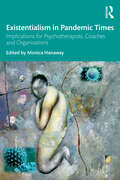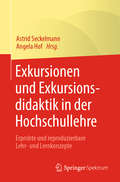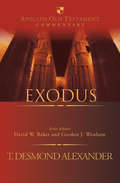- Table View
- List View
Executive Skills and Reading Comprehension
by Nell K. Duke Kelly B. CartwrightHow do K-12 students become self-regulated learners who actively deploy comprehension strategies to make meaning from texts? This cutting-edge guide is the first book to highlight the importance of executive skills for improving reading comprehension. Chapters review the research base for particular executive functions--such as planning, organization, cognitive flexibility, and impulse control--and present practical skills-building strategies for the classroom. Detailed examples show what each skill looks like in real readers, and sidebars draw explicit connections to the Common Core State Standards (CCSS). Reproducible planning and assessment forms can be downloaded and printed in a convenient 8 1/2" x 11" size.
Executive Skills and Reading Comprehension: A Guide for Educators
by Kelly B. CartwrightThis pioneering book is now in a revised and expanded second edition featuring the latest neuroscientific knowledge and instructional strategies. Kelly B. Cartwright provides a teacher-friendly explanation of executive skills--such as planning, organization, cognitive flexibility, and impulse control--and their role in reading comprehension. Detailed examples illustrate how each skill is deployed by strong comprehenders and ways to tailor instruction for students who are struggling. The companion website features reproducible planning and assessment forms from the book as well as supplemental card sorts to teach and assess cognitive flexibility, all ready to download and print in a convenient 8 1/2" x 11" size. New to This Edition *Updated throughout with advances in theory, research, and instruction. *Chapter on word recognition, with particular attention to dyslexia. *Information on the development of the brain's reading network. *Expanded emphasis on oral language comprehension. *Appendix of intervention studies; online-only supplement with card sorts to teach and assess cognitive flexibility.
Exemplars of Assessment in Higher Education, Volume Two: Strategies for a Changing Higher Education Environment
by Jane Marie Souza Tara A. RoseIn this second volume of the successful Exemplars of Assessment in Higher Education, editors Souza and Rose share examples of assessment practice from over fifteen distinct and diverse Higher Education Institutions, including international contributions. Building upon the work of the first volume, the case studies in this book reflect the changes in assessment and higher education in the post-Covid education environment. The institutions that appear in this book were chosen for having an effective assessment approach in one or more of the following areas: career readiness; distance education; diversity, equity, and inclusion; or general education. Each part of the book discusses one of these four areas, with chapters that feature real-life examples from the educators who teach at the college or university. Featuring a Foreword by AAC&U President Lynn Pasquerella, the work highlighted in this book is also aligned with AAC&U’s Valid Assessment of Learning in Undergraduate Education (VALUE) initiative to help educators make the best decisions about measuring student learning. This book is ideal for university educators and assessment practitioners looking to diversify and enhance their assessment practices.
Exemplars of Assessment in Higher Education: Diverse Approaches to Addressing Accreditation Standards
by Jane Marie Souza Tara A. RoseCo-published with “While assessment may feel to constituents like an activity of accountability simply for accreditors, it is most appropriate to approach assessment as an activity of accountability for students. Assessment results that improve institutional effectiveness, heighten student learning, and better align resources serve to make institutions stronger for the benefit of their students, and those results also serve the institution or program well during the holistic evaluation required through accreditation.” – from the foreword by Heather Perfetti, President of the Middle States Commission on Higher EducationColleges and universities struggle to understand precisely what is being asked for by accreditors, and this book answers that question by sharing examples of success reported by schools specifically recommended by accreditors. This compendium gathers examples of assessment practice in twenty-four higher education institutions: twenty-three in the U.S. and one in Australia. All institutions represented in this book were suggested by their accreditor as having an effective assessment approach in one or more of the following assessment focused areas: assessment in the disciplines, co-curricular, course/program/institutional assessment, equity and inclusion, general education, online learning, program review, scholarship of teaching and learning, student learning, or technology. These examples recommended by accrediting agencies makes this a unique contribution to the assessment literature.The book is organized in four parts. Part One is focused on student learning and assessment and includes ten chapters. The primary focus for Part Two is student learning assessment from a disciplinary perspective and includes four chapters. Part Three has a faculty engagement and assessment focus, and Part Four includes four chapters on institutional effectiveness and assessment, with a focus on strategic planning.This book is a publication of the Association for the Assessment of Learning in Higher Education (AALHE), an organization of practitioners interested in using effective assessment practice to document and improve student learning.
Exemplars of Curriculum Theory
by Arthur K. EllisThis book crosses the divide between theoreticians and practitioners by demonstrating how curriculum theories and models are applied in classrooms today. It ties together broad educational theories such as progressivism, essentialism, perennialism, etc.; curriculum models, characterized as learner-centered, society-centered or knowledge-centered; and exemplars of curriculum theories and models, such as Reggio Emilia, Core Knowledge, the International Baccalaureate, etc.
Exemplary Instruction in the Middle Grades: Teaching That Supports Engagement and Rigorous Learning
by Diane Lapp Barbara MossOffering fresh alternatives to common instructional practices that fail to get results, this accessible, highly practical guide highlights ways to motivate middle school students while enhancing content-area learning. Each chapter features an enlightening case study of a teacher whose current strategies are not supported by research; describes effective instructional alternatives, illustrated with concrete examples; and lists online resources and lesson examples. Emphasis is given to supporting critical engagement with texts and drawing on technology and new literacies. The book covers specific content areas—including science, social studies, math, and literature—as well as ways to teach oral literacy and writing across the curriculum.
Exemplary Literacy Teachers, Second Edition
by Cathy Collins Block John MangieriIdentifying what exemplary teachers know and do to promote literacy achievement at every grade level, this highly motivating book provides step-by-step guidance for professional development. It helps teachers assess their strengths and build their competencies in six key domains of literacy instruction directly linked to student success. Featuring skills-building exercises, sample lesson plans, book lists, and over a dozen reproducibles, the book illustrates specific actions that teachers can take to emulate their most effective colleagues in school districts around the country. New to This Edition Revised and updated based on the authors' professional development work with over 20,000 educators. Expanded to cover K 12 (prior edition covered K 5). Now includes material for literacy coaches and administrators, as well as teachers. "Teacher-in-Action" cases offer vivid snapshots of exemplary practices. Many of the activities and reproducibles are new or revised.
Exemplary Practices for Secondary Math Teachers
by Alfred S. Posamentier Stephen Krulik Daniel JayeEvery year new secondary mathematics teachers take up positions in middle and high schools. The luckiest novices receive assistance from a coach or mentor: a master mathematics teacher who makes constructive comments, models effective approaches, and illuminates other practical aspects of teaching secondary math. But many new teachers don t have this advantage and must further their development on their own. If you are one of these teachers, this is the book you need. <p><p> In these pages, veteran mathematics educators Alfred S. Posamentier, Daniel Jaye, and Stephen Krulik present a treasure chest of ideas to guide new secondary math teachers through the challenging first few months and also provide more experienced teachers with interesting alternatives to familiar methods.
Exemplary Practices in Marine Science Education: A Resource for Practitioners and Researchers
by Géraldine Fauville Diana L. Payne Meghan E. Marrero Annika Lantz-Andersson Fiona CrouchThis edited volume is the premier book dedicated exclusively to marine science education and improving ocean literacy, aiming to showcase exemplary practices in marine science education and educational research in this field on a global scale. It informs, inspires, and provides an intellectual forum for practitioners and researchers in this particular context. Subject areas include sections on marine science education in formal, informal and community settings. This book will be useful to marine science education practitioners (e.g. formal and informal educators) and researchers (both education and science).
Exemplary Teachers of Students in Poverty
by Wayne Sawyer Geoff Munns Bronwyn ColeEducation and poverty exist in a highly contested relationship even in the developed world. On the one hand, educational outcomes seem solidly attached to socio-economic status, and on the other, education is often cited as a way out of poverty. Success at de-coupling poverty from educational outcomes varies across the developed world. The issues connecting education and poverty are complex, but the question of the successful engagement of students from poor backgrounds involves a complex mix of public policy on poverty, public policy on education, and teacher action. This book focuses on a number of exemplary teachers who demonstrate a set of common pedagogical qualities, assisting them to work productively with persistent classroom challenges in low SES classrooms. Exemplary Teachers of Students in Poverty shares successful classroom practice from schools serving diverse and disadvantaged communities, and stresses that opportunities in school can influence educational engagement and encourage students to achieve. The text locates itself in international debates about education and poverty, and reports on the Teachers for a Fair Go project - an Australian research project into the work of a number of teachers who were successful at engaging students from poor backgrounds. Included in the book: teaching in low SES communities what exemplary teachers of students in low SES communities do specific pedagogical approaches in literacy, ICT, creativity and culturally responsive practices students’ voices professional qualities of these teachers Exemplary Teachers of Students in Poverty will greatly benefit researchers, teacher educators and trainee teachers, allowing them to gain a much deeper understanding of the issues, constraints and perspectives in teaching contexts across low SES communities.
Exercise Physiology for Health, Fitness, and Performance (Lippincott Connect)
by Denise Smith Sharon Plowman Michael OrmsbeeWith this new 6th Edition, Exercise Physiology for Health, Fitness, and Performance continues to provide an authoritative resource for mastering exercise physiology. This engaging, accessible and approachable resource integrates theoretical and research-based basic exercise physiology with real-world application to prepare students for exciting positions in exercise science, fitness, physical education, athletic training, rehabilitation, coaching, and/or allied health professions. Updated throughout, the text uses sound pedagogical principles to explain scientific research that is the foundation of exercise physiology and incorporates multiple features to help students apply their knowledge to improve human health, fitness, and performance. Content in this edition is organized by independent units (Metabolic, Cardiovascular-Respiratory, Neuromuscular-Skeletal, and Neuroendocrine-Immune), offering maximum teaching flexibility for faculty and ensuring a consistent, efficient, and effective learning experience for students.
Exercise Physiology: Nutrition, Energy, and Human Performance
by Frank I. Katch Victor L. Katch William McArdleSelected as a Doody's Core Title for 2022! <P><P> Lippincott® Connect Featured Title Purchase of the new print edition of this Lippincott® Connect title includes access to the digital version of the book, plus related materials such as videos and multiple-choice Q&A and self-assessments. <P><P> Join the nearly half a million students who have built a solid foundation in the scientific principles underlying modern exercise physiology with this trusted, trendsetting text. Exercise Physiology: Nutrition, Energy, and Human Performance, 9th Edition, presents a research-centric approach in a vibrant, engaging design to make complex topics accessible and deliver a comprehensive understanding of how nutrition, energy transfer, and exercise training affect human performance. The extensively updated 9th Edition reflects the latest advances in the field as well as a rich contextual perspective to ensure readiness for today’s clinical challenges.
Exercise Your College Reading Skills: Developing More Powerful Comprehension
by Janet ElderContains exercises designed to help students strengthen their college-level vocabulary and reading comprehension skills.
Exercises In English 2013 Level G Student Book: Grammar Workbook (Exercises In English 2013 Series)
by Loyola PressExercises in English grammar workbooks are designed to give students in grades 3 through 8 comprehensive grammar practice in every area of grammar, usage, and mechanics. Features: More grammar practice than any other grammar workbook, allows students to master GUM skills, Spiral curriculum reinforces grammar skills in every grade, Self-teaching student grammar lessons optimize class time, Section reviews offer regular assessment opportunities, Becoming stronger in grammar requires practice, and this book provides students with lifelong skills they will need to succeed.
Exercises in Architecture: Learning to Think as an Architect
by Simon UnwinArchitecture is a doing word. You can learn a great deal about the workings of architecture through analysing examples but a fuller understanding of its powers and potential comes through practice, by trying to do it... This book offers student architects a series of exercises that will develop their capacity for doing architecture. Exercises in Architecture builds on and supplements the methodology for architectural analysis presented in the author’s previous book Analysing Architecture (third edition, Routledge, 2009) and demonstrated in his Twenty Buildings Every Architect Should Understand (Routledge, 2010). The three books taken together deal with the three aspects of learning: description, analysis of examples, and practice. The book offers twelve exercises, each divided into a short series of tasks aimed at developing a particular theme or area of architectural capacity. The exercises deal with themes such as place-making, learning through drawing, framing, light, , uses of geometry, stage setting, eliciting emotional responses, the genetics of detail and so forth.
Exercises in English: Grammar Workbook, Level H (Exercises In English 2013)
by Loyola PressExercises in English grammar workbooks are designed to give students in grades 3 through 8 comprehensive grammar practice in every area of grammar, usage, and mechanics. Features: More grammar practice than any other grammar workbook, allows students to master GUM skills, Spiral curriculum reinforces grammar skills in every grade, Self-teaching student grammar lessons optimize class time, Section reviews offer regular assessment opportunities, becoming stronger in grammar requires practice, and Exercises in English provides students with lifelong skills they will need to succeed.
Exercises in Programming Style
by Cristina Videira LopesThe first edition of Exercises in Programming Style was honored as an ACM Notable Book and praised as "The best programming book of the decade." This new edition retains the same presentation but has been upgraded to Python 3, and there is a new section on neural network styles. Using a simple computational task (term frequency) to illustrate different programming styles, Exercises in Programming Style helps readers understand the various ways of writing programs and designing systems. It is designed to be used in conjunction with code provided on an online repository. The book complements and explains the raw code in a way that is accessible to anyone who regularly practices the art of programming. The book can also be used in advanced programming courses in computer science and software engineering programs. The book contains 40 different styles for writing the term frequency task. The styles are grouped into ten categories: historical, basic, function composition, objects and object interactions, reflection and metaprogramming, adversity, data-centric, concurrency, interactivity, and neural networks. The author states the constraints in each style and explains the example programs. Each chapter first presents the constraints of the style, next shows an example program, and then gives a detailed explanation of the code. Most chapters also have sections focusing on the use of the style in systems design as well as sections describing the historical context in which the programming style emerged.
Exercising Muscles and Minds, Second Edition: Outdoor Play and the Early Years Curriculum
by Marjorie Ouvry Amanda FurtadoThis updated edition of the seminal 2003 text on outdoor play in early years provision taps into the major issues around nutrition, exercise and mental wellbeing in this field. Focusing on the importance of outdoor play from birth to age five, Exercising Muscles and Minds, Second Edition aids practitioners in planning for learning outside throughout the year.Updated to include engagement with new research and practice that has emerged since 2003, the book explores the neurological benefits of exercise and outdoor play; the debates on risk; technology and indoor play; development of Forest Schools, Beach Schools and Nature Kindergartens; and rebranding and development of early years teaching methods.Full of case studies and ideas for activities, equipment and resources, this practical guide is full of useful guidance for working outdoors with young children - whether in largest of green areas or the smallest of back yards.
Exhibiting Photography: A Practical Guide to Displaying Your Work
by Shirley ReadYou have the camera, you have the skills, and you have the pictures. Now what? Author Shirley Read expertly leads you through the world of exhibiting your photography one minute detail at a time. From finding a space and designing the exhibition to actually constructing a show and publicizing yourself, every aspect of exhibiting your photography is touched upon and clarified with ample detail, anecdotes, and real life case studies. In this new and expanded second edition, Shirley Read further illuminates the world of social networking, exhibiting, and selling photography online so your work is always shown in the best light. Packed with photos of internationally successful exhibitions, check lists, and invaluable advice, this essential reference guide will help amateur and professional photographers alike successfully showcase their bodies of work with confidence and finesse.
Exile as an Educative Engagement: The Dizziness of Recognition (Studies in Curriculum Theory Series)
by Parmis AslanimehrThis book explores the concept of exile, experienced not as a physical displacement but as a subjective experience of disconnection from the Other. It further clarifies the notion of exilic subjectivity, whereby a hidden facet of the self—ineffable both to the Other and to the Self—causes a distance between self-comprehension and external perception. In doing so, it poses a challenge to recognition theory’s assertion that self-understanding occurs through interactions with Others. Engaging with the writings of Georg Wilhelm Friedrich Hegel, Charles Taylor, Axel Honneth, Søren Kierkegaard, and Rumi, the book explores the difficulties individuals encounter when transitioning their inwardly focused private identities into public spaces, such as educational institutions. It emphasizes the critical role educators can play in cultivating an atmosphere of attentive listening attuned to the unique experiences that may exile the self. Through the complex interplay of writings by thinkers such as Hegel, Kierkegaard, Rumi, Taylor, and Pinar, this work transcends traditional theories of recognition. Rather than resolving misrecognition, it embraces it as a central aspect of the human condition, examining the tension between self-perception and external acknowledgement. The text phenomenologically investigates “seeing” the Other and the risk of misrecognizing an individual’s innermost depths. These insights find resonance in academia, where even amid success, a chasm may persist, isolating students and educators from each other. As the self dwells in the uneasiness of estrangement, the discussion welcomes the ownership of silence and inwardness into the classroom. From this detached perspective, the possibility of recognizing the convergence of familiarity and strangeness before and within oneself may emerge.This book is tailored for scholars, educators, and readers interested in the intersections of philosophy, education, and lived experience. It offers readers innovative approaches to understanding exile and recognition, fostering deeper engagement with the complexities of identity, alienation, and the self.
Exile: Old Testament, Jewish, And Christian Conceptions (Supplements To The Journal For The Study Of Judaism Ser. #Vol. 56)
by James M. ScottExile: A Conversation with N. T. Wright
Existential Crises in Educational Administration and Leadership: Existential Anxiety and Loss of Meaning in the Gaze of Munch’s ‘The Scream’ (Routledge Research in Educational Leadership)
by Eugenie A. SamierThis book examines the theoretical foundations relevant to existential issues in educational leadership and management, taking inspiration from Munch’s painting The Scream. The book considers internationally relevant topics such as the growth of neoliberalism, globalisation, cultural shifts, forced migration and the digitalisation of the socio-cultural sphere and uniquely positions these crises as existential threats, rather than simply political, cultural or social. The volume explores this complex set of dimensions in existential experience and outlines the implications for research and teaching in educational leadership. By exemplifying the narrative and introspective nature of existential research, the book addresses major aspects of the field including the impact such threats have for organisational studies, policy, administrative structures and practices, and leadership. This timely collection on existential issues in administration and leadership will appeal to academics, scholars, researchers, practitioners and policy-makers. It will also be of great interest for students in teacher education programmes and graduate courses in educational administration and leadership, organisation studies, and educational ethics for broad international use.
Existentialism in Pandemic Times: Implications for Psychotherapists, Coaches and Organisations
by Monica HanawayBuilding on Monica Hanaway’s previous publications, this timely volume considers the benefits of bringing an existential approach to psychotherapy, coaching, supervision and leadership, particularly in times of crisis. The book uses an existential lens to examine the impact Covid-19 has had on our mental health and ways of being, making connections between situations that challenge our mental resources and the unique ways existential ideas can address those challenges. Featuring contributions from renowned existential thinkers and practitioners, the book connects personal experiences with clinical examples and philosophic ideas to explore concepts like anxiety, relatedness and uncertainty as they relate to key existential themes, helping to inform coaches and therapists in their work with clients. Existentialism in Pandemic Times is important reading for coaches, therapists, psychologists and business leaders, as well as for scholars and researchers interested in applied philosophy.
Exkursionen und Exkursionsdidaktik in der Hochschullehre: Erprobte und reproduzierbare Lehr- und Lernkonzepte
by Astrid Seckelmann Angela HofWelche Möglichkeiten gibt es, jenseits von klassischen Führungen Wissen zu vermitteln? Wie motiviere ich erwachsene Lernende zum Mitarbeiten auf einer Exkursion? Welche Kompetenzen kann ich im Gelände schulen? Das vorliegende Buch bietet Ihnen systematische, lehr- und lerntheoretische fundierte Arbeitshilfen für die Vorbereitung und Durchführung von Exkursionen, zudem Anregungen für die Exkursionsgestaltung in verschiedenen Arbeitsbereichen. Es zeigt auf, wie didaktische Möglichkeiten mit institutionellen Gegebenheiten in Einklang gebracht werden können. Sie erfahren, wie die unterschiedlichen Optionen, einen Raum zu begehen, die Umwelt zu interpretieren oder kulturelle Praktiken zu erkennen in eine strukturierte, zielorientierte Lehrveranstaltung umgesetzt werden können. Das Buch eröffnet Ihnen eine breite Palette innovativer Zugänge zu Exkursionen und liefert dazu konkrete Beispiele für Lehr- und Lernmaterialien. Praktische Tipps zu Voraussetzungen, Kosten, Vorbereitungs-, Durchführungs- und Nachbereitungsaufwand runden die Beiträge ab und geben Ihnen eine optimale Starthilfe für die Konzeption, Planung und Durchführung eigener Exkursionen.
Exodus (Apollos Old Testament Commentary Series)
by T. Desmond AlexanderRecounting the greatest event of divine salvation in the Old Testament, the book of Exodus is not merely a story about the Lord God rescuing enslaved Israelites from the power of a despotic and xenophobic dictator. More importantly, it highlights how a compassionate and justice-seeking God transforms the lives of victimized people so that they may experience life in all its fullness in his holy presence. This transformation involves a unique process that includes redemption, ransoming, cleansing, and consecration. The story of Exodus illustrates an all-important paradigm for understanding the nature and goal of divine salvation, anticipating an even greater exodus that will come through Jesus Christ. In this Apollos Old Testament Commentary volume, Desmond Alexander grapples with the many and varied complexities of the carefully constructed literary collage of Exodus. As an integral part of the longer narrative that runs from Genesis to 2 Kings, Exodus recounts a dramatic and unified story of how the Israelites come to a deep and close relationship with the Lord God. Narrating past events, Exodus speaks to contemporary society, revealing a God who passionately desires to draw people into an intimate and exclusive relationship with himself. This detailed commentary sheds fresh light on one of the most influential books ever written.
